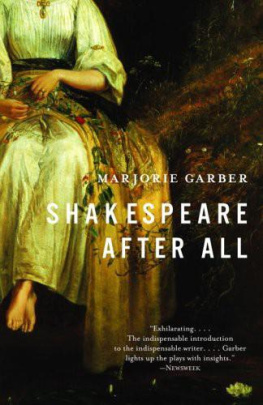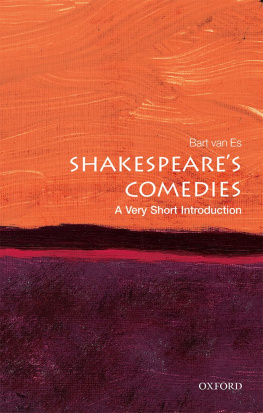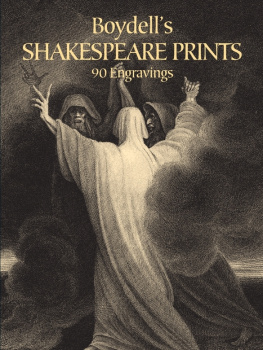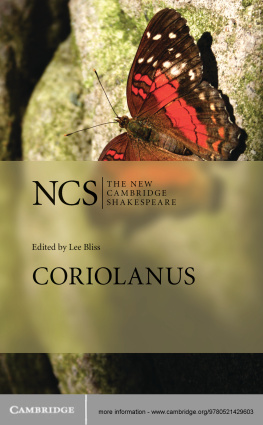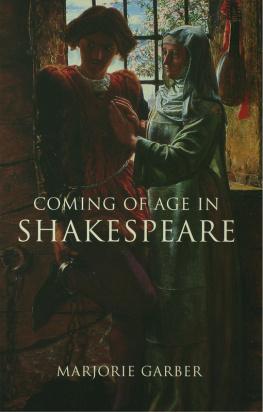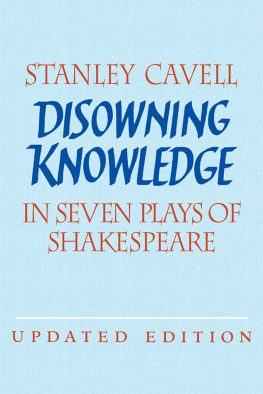ACCLAIM FOR MARJORIE GARBER'S
Shakespeare After All
A return to the times when the critic's primary function was as an enthusiast, to open up the glories of the written word for the reader.
The New York Times
A lifetime of learning has gone into the production of this massive volume. Garber is sensitive to significant details in the language and she gives cogent accounts of historical contexts.
The Boston Globe
She lights up the plays with insights you'll kick yourself for not having had first.
Newsweek
A delight. Polished, thoughtful, eminently useful. Not only a wonderful guide to the plays, but just as importantly, it's a guide to the reading of the plays. Garber writes elegantly and insightfully. The reader seeking an informed guide to each play simply can not do better.
The Providence Journal
Impossibly full engagingly written. It fills you with gratitude on virtually every page. Here, in a book, is a Shakespearean course for our time.
The Buffalo News
An absolute joy. Extremely lively and witty. Remarkable. Authoritative.
Tucson Citizen
Stimulating and informative.
The Charlotte Observer
Garber keeps her eye on the goal, to illuminate the experience of reading and seeing the plays, and achieves it with quiet efficiency.
San Jose Mercury News
A commanding performance, not to be missed. Garber brings the Bard into our hearts. Fascinating.
Republican-American (Waterbury, CT)
Shakespeare After All is worth the cost for the introduction alone.
South Florida Sun-Sentinel
Every page has something that will make you rethink what you've seen or read, or make you want to read a work for the first time.
The Register-Guard (Eugene, OR)
Her chapters on individual plays have the rhythm of the classroom and the voice of the master teacher who still marvels at her subject.
The Bloomsbury Review

Shakespeare After All
Marjorie Garber is William R. Kenan, Jr., Professor of English and American Literature and Language and chair of the Department of Visual and Environmental Studies at Harvard University. She lives in Cambridge and Nantucket, Massachusetts.
ALSO BY MARJORIE GARBER
A Manifesto for Literary Studies
Quotation Marks
Academic Instincts
Sex and Real Estate
Symptoms of Culture
Dog Love
Bisexuality and the Eroticism of Everyday Life
Vested Interests: Cross-Dressing and Cultural Anxiety
Shakespeare's Ghost Writers: Literature as Uncanny Causality
Coming of Age in Shakespeare
Dream in Shakespeare
For B. J., the onlie begetter
Indeed all the great Masters have understood that there cannot be great art without the little limited life of the fable, which is always the better the simpler it is, and the rich, far-wandering, many-imaged life of the self-seen world beyond it.
William Butler Yeats, Emotion of Multitude
CONTENTS
A NOTE ON THE TEXT
T HERE ARE MANY excellent modern editions of Shakespeare's plays. In the Suggestions for Further Reading at the end of this book I list several of the best-known, most reliable, and most available recent editions, with the expectation that a reader of this book may already own a copy of the collected works of Shakespeare or individual editions of the plays. The act, scene, and line numbers cited in the chapters that follow refer to The Norton Shakespeare (1997), itself based on the text of The Oxford Shakespeare (1986), but readers who own or have access to other editions will be able to find the quoted passages without difficulty. Line numbers may vary slightly, since lines of prose will be of differing lengths depending upon the width of the printed page or column. For textual variants and alternative readings from Quarto or Folio texts, readers should consult the textual notes in any good modern edition. When citing the names of characters in the plays, I have occasionally departed from the choices made by the Norton editors, preferring, for example, the more familiar Brabantio to Brabanzio in Othello, Gratiano to Graziano in The Merchant of Venice, Ancient Pistol to Ensign Pistol in Henry IV Part 2 and Henry V, and Imogen to Innogen in Cymbeline. I have also chosen to quote from the 1623 Folio edition of King Lear instead of the Norton Shakespeare's conflated version. All biblical citations, unless noted otherwise, are from the 1599 edition of the Geneva Bible.
Although it is not possible to know with certainty the chronology of composition of the playsor even, sometimes, of their performancethe sequence given here follows the order suggested by The Norton Shakespeare with the exception of a few minor changes. For the convenience of the general reader Henry VI Part 1 is discussed before Part 2 and Part 3, even though it was written after them. The Norton editors place The Merry Wives of Windsor between Henry IV Part 1 and Henry IV Part 2, but I have elected, again for reasons of readerly convenience, to discuss the two history plays in adjacent chapters. In this case the plays in questionMerry Wives and 2 Henry IV-are dated in the same years, so there is no significant disruption of chronology. With Romeo and Juliet and A Midsummer Night's Dream, two plays thought to have been written in the same time period, I have reversed the Norton's order, choosing to discuss Shakespeare's love tragedy before moving on to his great comic send-up of tragical love. Likewise, I discuss Cymbeline before The Winter's Tale. Modern scholars differ about which of these two plays was written first; each was performed in 1611. But such changes are a matter of editorial discretion and do not affect the argument for a generally historical sequence. Readers should bear in mind that the dating of the plays is in many cases still highly speculative and controversial, and that it is therefore difficult to draw firm conclusions about Shakespeare's development as a playwright from this, or any, order of the plays. The presentation of plays in this volume follows the practice of the Norton, Oxford, and other recent editions in grouping the plays by approximate chronology rather than according to genres like comedy, history, tragedy, and romance, with the intent of allowing the reader to observe the use of images, staging, and language across genres in the course of Shakespeare's theatrical career.
Introduction
E VERY AGE creates its own Shakespeare.
What is often described as the timelessness of Shakespeare, the transcendent qualities for which his plays have been praised around the world and across the centuries, is perhaps better understood as an uncanny timeliness, a capacity to speak directly to circumstances the playwright could not have anticipated or foreseen. Like a portrait whose eyes seem to follow you around the room, engaging your glance from every angle, the plays and their characters seem always to be modern, always to be us.

